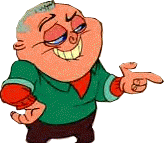
Spümcø, Inc. was an American animation studio that was active from 1989 to 2005 and based in Los Angeles, California. The studio was best known for working on the first two seasons of The Ren & Stimpy Show for Nickelodeon and for various commercials. The studio won several awards, including an Annie Award for Best Animated Short Subject for the music video of the song "I Miss You" by Björk.

George Liquor is a cartoon character created by John Kricfalusi. Liquor is most famous for his appearances on The Ren & Stimpy Show. He is considered Kricfalusi's signature character and was a mascot for Kricfalusi's defunct animation studio, Spümcø. Kricfalusi portrayed George Liquor as a patriotic, outspoken, politically conservative blowhard. Kricfalusi described Liquor as his favorite character to animate.

"Robin Höek" is the third episode of the first season of The Ren & Stimpy Show. It originally aired on Nickelodeon in the United States on August 25, 1991. This episode is the first in a short-lived series of episodes called Stimpy's Storybook Land, which parody children's literature.

"Man's Best Friend" is an episode from the second season of the American animated television series The Ren & Stimpy Show. It was originally intended to air on Nickelodeon on August 22, 1992, as the second half of the second episode of Season 2, but was pulled before airing and replaced by a censored version of "Big House Blues". It eventually aired on the soft launch of Spike TV on June 23, 2003. In the episode, Ren and Stimpy learn about obedience after George Liquor takes them home with him and swears to make them "champions".

"Hard Times for Haggis" is the thirteenth episode of the third season of The Ren & Stimpy Show. It originally aired on Nickelodeon in the United States on April 30, 1994.

"The Royal Canadian Kilted Yaksmen" is the nineteenth episode and season finale of the second season of The Ren & Stimpy Show. It originally aired on Nickelodeon in the United States on May 23, 1993, and is the final episode to be aired with input from Spümcø.

"Jimminy Lummox" is the seventh episode of the third season of The Ren & Stimpy Show. It originally aired on Nickelodeon in the United States on February 19, 1994.

"Fire Dogs" is the eighth episode of the first season of The Ren & Stimpy Show. It originally aired on Nickelodeon in the United States on September 29, 1991.

"Sven Höek" is the sixth episode of the second season of The Ren & Stimpy Show. It originally aired on Nickelodeon in the United States on November 7, 1992.

"Big House Blues" is a 1990 American animated comedy film produced by Spümcø. Originally screened at a film festival, with a censored version later airing on Nickelodeon, it was succeeded by The Ren & Stimpy Show on the network, to which it serves as a pilot episode.

"Rubber Nipple Salesmen" is the fifth episode of the second season of The Ren & Stimpy Show. It originally aired on Nickelodeon in the United States on August 29, 1992.

"Haunted House" is the seventh episode of the second season of The Ren & Stimpy Show. It originally aired on Nickelodeon in the United States on November 21, 1992.

"Black Hole" is the eleventh and penultimate episode of the first season of The Ren & Stimpy Show. It originally aired on Nickelodeon in the United States on February 23, 1992. It is the third and final episode in a loosely linked trilogy known as the "space episodes", set in the show-within-the-show The Adventures of Commander Höek and Cadet Stimpy.

"Mad Dog Höek" is the eighth episode of the second season of The Ren & Stimpy Show. It originally aired on Nickelodeon in the United States on November 21, 1992.

"Big Baby Scam" is the ninth episode of the second season of The Ren & Stimpy Show. It originally aired on Nickelodeon in the United States on December 12, 1992.

"Dog Show" is the tenth episode of the second season of The Ren & Stimpy Show. It originally aired on Nickelodeon in the United States on December 12, 1992. It is the final appearance of George Liquor in the series, as John Kricfalusi was fired midway through production and reclaimed the rights to the character, utilizing it as Spümcø's mascot.

"A Yard Too Far" is the second episode of the third season of The Ren & Stimpy Show. It originally aired on Nickelodeon in the United States on November 20, 1993.

"Eat My Cookies" is the fourteenth episode from the third season of The Ren & Stimpy Show. It originally aired on Nickelodeon in the United States on June 4, 1994.


















